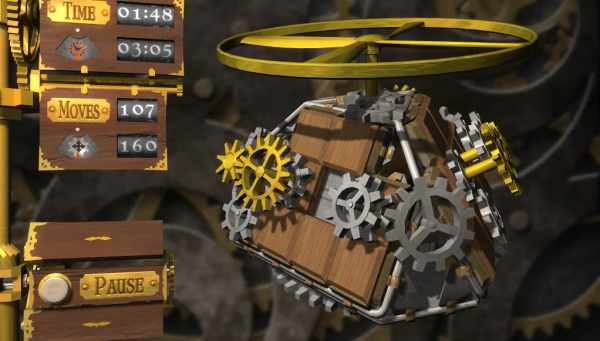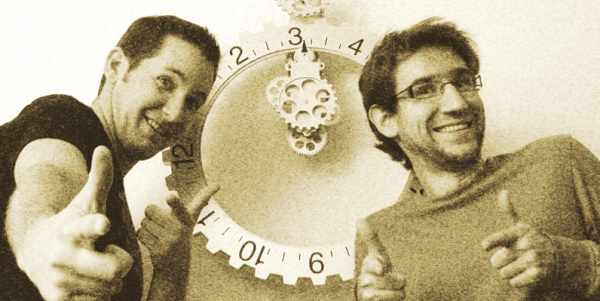IGF Factor 2010: Cogs

How beautiful, how wonderful can you make a sliding puzzle game? With a steam-punk flourish, Lazy 8 Studios' Cogs shows exactly how far the genre can be pushed. Comrade Walker - our official master of puzzles - totally adored it upon its release. Now that it's picked up a nomination for Excellence in Design, we thought it time to talk to their Rob Jagnow about all things indie-games. Footage and chattage follows...
RPS: Firstly, a brief intro to those who may not know you. Who are you? What's your background? Why get into games? Why get into indie games?
Rob Jagnow: I was told there would be 5 questions. I just counted 4, so I'll try to make these answers really good.
I'm Rob Jagnow, founder of Lazy 8 Studios in San Francisco. I'm sort of a cross between an engineer and an artist. I love the challenge of programming, but also need an outlet for my creativity. Game development is, to me, the perfect match. My creativity can come through in puzzle and UI designs, but I still get to work with the nuts and bolts of the software. Let's be honest, though -- I'm a better engineer than I am an artist. Thankfully, Brendan Mauro came on board Lazy 8 Studios to replace my crappy engineer art with the polished wood and brass that you see today.
One of the concepts that draws me to indie games in particular is the Maximization of Awesomeness per Capita™. Here's how it works: when you're just one guy, you can create a game that's exactly as awesome as what one guy can do. If you team up with the right partner, there's this mysterious thing that the business gurus like to call synergy that lets you create something that's more than twice as awesome as what one person can do alone. With three people, you may be able to do more than triple what one can do. But that synergistic power doesn't go on forever. Ten people can only do a game that is, maybe, five times as awesome as what one person can do. When you normalize this curve to maximize awesomeness per capita, it peaks right around teams of 2-5. I love small teams like that where everyone can really make a substantial contribution to the project. As a result, everyone feels a sense of ownership, which keeps the quality high.
Here's a graph to make it more clear:
RPS: And... the game. Tell us about it. What was its origins? What are you trying to do with it? What are you most pleased about it? What nags?
Rob Jagnow: That's eight questions already. I knew it.
Oddly enough, the inspiration for Cogs came from playing minesweeper. It's not that minesweeper is inspirational. In fact, quite the opposite. One night, while I was trying to beat my best times, I stopped to think about how many hours I'd wasted on such a simple game. I figured that if I spent that time creating a new game, I could come up with something far more interesting. So I thought about what I like -- gears, pipes and steam-powered machines -- and the concept eventually evolved into Cogs.
What really makes me happy about the result is that even after years of development, I still enjoy playing it. There are, of course, business realities that can sometimes be depressing -- like responding to emails from angry buyers who don't have the hardware horsepower for Cogs. Or more recently, complaints from iPhone customers who think that a dollar is too much to pay for an hour or two of puzzles. But mostly, Cogs has been very well-received. In fact, a Cogs puzzle-modding community is just getting started, so I'm going to try to do what I can to encourage that.

RPS: What's your feelings on the IGF this year. Pleased to be nominated? Have particular love, bemusement or hate for any of the other entries? Is there anything you think is missing?
Rob Jagnow: It's an incredible honor to be included in such an amazing list of nominees. I've talked with a number of other successful indie developers who said that IGF nominations in previous years were what their games really needed to take flight. And we're already seeing a lot of extra visibility from our nomination for Excellence in Design.
RPS: How do you feel about the indie scene generally this year? People have been relatively downbeat about 2009, after 2008 being so obviously incendiary. What are the themes, in your eyes? What are people missing?
Rob Jagnow: If I had to pick a title theme for the indies this year, I'd say Camaraderie. I feel like with the big studios, it's all about secrets and scoops -- doing what it takes to get ahead. In contrast, I feel like indie studios understand that when one indie game gets recognition, we all benefit. It gets people to say, "Hey, these little start-ups are delivering far more creativity than the big studios, and at a fraction of the price." There are so many indie studios that I owe for the great advice they've given along the way: 2DBoy, Wolfire, NimbleBit, Dejobaan, Demiurge...

RPS: And how does the future look for you? What are you working on now and the foreseeable future.
Rob Jagnow: I'm more than ready to move on to my next game idea. I have far more ideas that I'd like to pursue than I possibly have time for. Maybe it's time to bring another programmer on board. But for now, I'm still focusing my attention on Cogs. We released an iPhone version at the end of January, and it's doing very well. So now it's time to get it ready for the iPad. We also want to keep improving the PC version of Cogs, so we should be releasing a patch in a few weeks that will speed up the rendering and add some new language options.
Oh, and for the record: 15 questions.
RPS: Thanks for your time.
Cogs can be bought from Lazy 8 Studios' site. There's also a demo available. Go gets!
